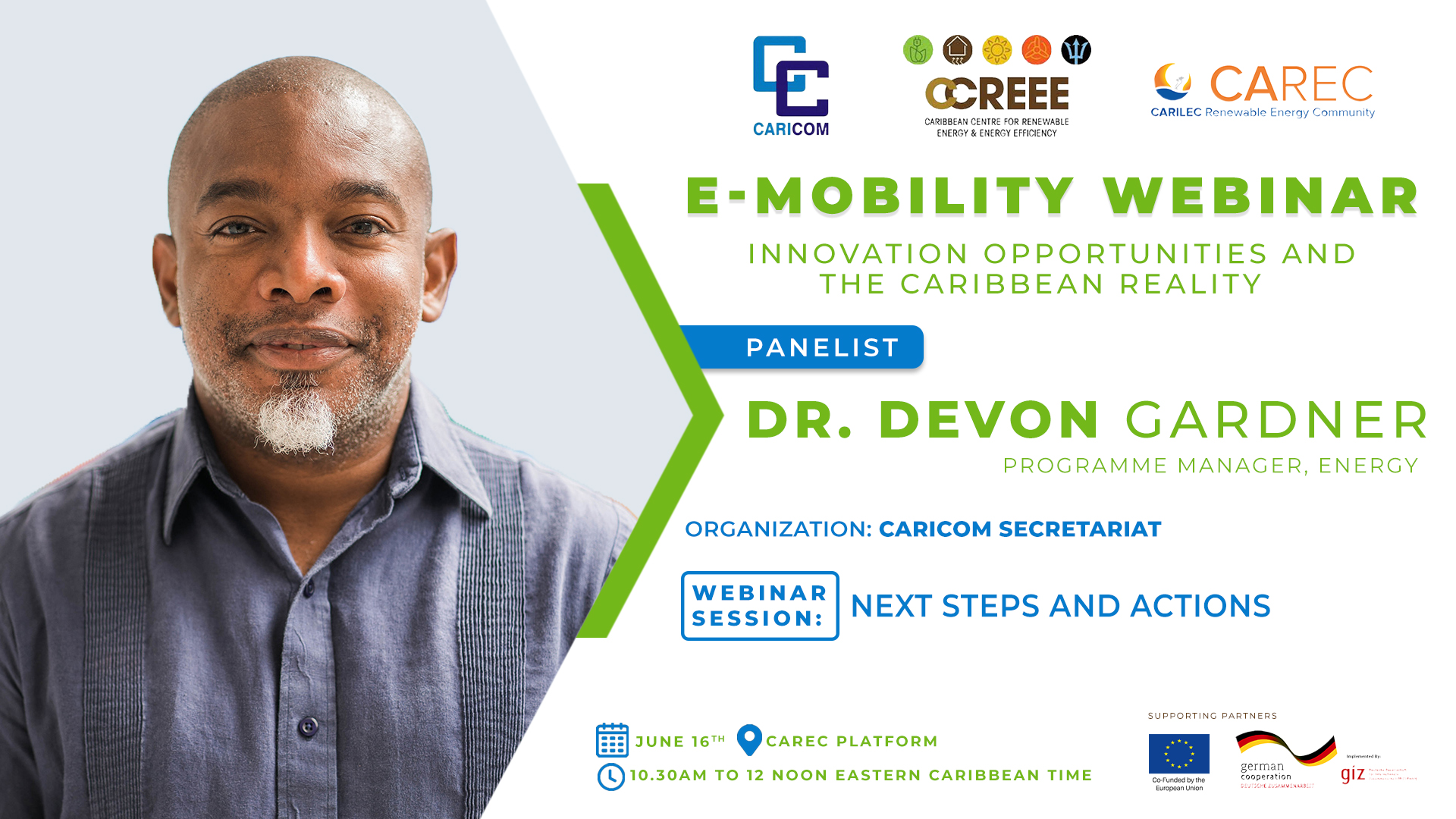
Stakeholders in the energy and transportation sectors were charged not to wait until a comprehensive plan and perfect conditions are available in order to get started on the Regional Electric Vehicle Strategy during an online discussion, which focused on innovation opportunities and the Caribbean reality.
The discussion, which was hosted by the Caribbean Centre for Renewable Energy and Energy Efficiency (CCREEE) and the Energy Unit of the CARICOM Secretariat, saw more than two hundred and fifty stakeholders gathered to hear from regional and global experts in the field. Stakeholders also had the opportunity to express their opinions and have their queries addressed.
The Need for Regional Coordination
During the online event, attendees in majority identified cost as the most important factor when deciding on an electric vehicle (EV) purchase versus an Internal Combustiable Engine (ICE) vehicle. In response, panelist Xavier Gordon shared that the total cost of ownership of an EV is lower when compared to an ICE vehicle, as global market trends show a decline in EV costs. He warned, however, that there is a need to produce economies of scale in the region, which could in turn further reduce costs for CARICOM Member States and consumers; particularly procurement costs.
Mr Gordon added that both public-private partnerships, particularly in the installation of charging infrastructure, and regulator-utlity collaboration for the development of attractive charging prices for consumers, are key innovative approaches to support the adoption of EVs. To stimulate market response in the region, project implementation and demonstration is important, panelists shared. Antonio Sealy of the Barbados Light and Power Company Limited revealed that when the Electric Bus Project commenced in Barbados, they began to receive significant interest from global EV service providers.
Innovation Opportunities & Challenges
Head of the CARICOM Energy Unit Dr Devon Gardner responded to the charge to “get started” by sharing that CARICOM, with the financial support of the German Federal Ministry for Economic Cooperation and Development (BMZ) through the German Corporation for International Cooperation (GIZ) implemented TAPSEC Project, was in the process of having a Regional Electric Vehicle Strategy (REVS) prepared. Project implementation will continue at the same time, with a view to having relevant projects inform the strategy. This was in line with another recommendation from panelist Andrea Denzinger, who suggested that the region implement pilot projects and allow them to create data and build trust.
In their quest to support the development of the sustainable transport sector, the CARICOM Secretariat – through its Energy Unit – and the CCREEE have established a Regional Electric Vehicle Working Group to produce the Regional Electric Vehicle Strategy Framework. Having been presented with an overview of the framework, eighty-five percent (85%) of participants joining the discussion indicated that they were sufficiently convinced of the need for such a strategy. Nonetheless, there were cautions in light of the financial implications of the COVID-19 pandemic. Panelist Xavier Gordon shared that he completed the region’s first empirical meter reading study in 2017 and, the results show that electrication makes sense for the region. Nevertheless, he noted that access to finance may be significantly slowed as countries and donors redirect available funds.
The Caribbean Reality
Within the region, several opportunities exist to propel a transition towards wide-spread use of electric mobility, according to panelists. Sharing on the Barbados experience in implementing the Electric Bus Project where 33 electric buses are being procured, panelist Antonio Sealy told attendees that there is tremendous value to the transport sector, through electrification of public transportation. He maintained that cost benefits are to be found through fueling and maintenance, with estimated savings of BBD $2M annually for the current project. Improved comfort and commuter experiences, as well as reduced environmental impact through lessenend noise and greenhouse gas emissions were also identified as advantages.
The University of the West Indies is also supporting the electric mobility sector through their Electric Vehicle Research and Development Platform (EVRDP) and, an application developed to control charging time, to avoid congestion in the electrical network. Professor Chandrabhan Sharma explained the characteristics of EV charging, noting that uncoordinated charging can put significant stress on the power system, whereas providing power from a vehicle to the grid could contribute to stabilising the power grid and improve contribution of intermittent renewable energy supply to the electrical network.
This discussion was another step toward the development and implementation of the Regional Electric Vehicle Strategy which will lean on lessons learned from other jurisdictions and projects; and incorporate plans and approaches to produce economies of scale, within CARICOM. This is all to be accomplished with the ultimate goal of transforming the regional energy sector, for the benefit of Caribbean people.